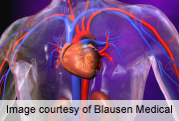However, does up BP in supraventricular tachycardia
FRIDAY, Jan. 16, 2015 (HealthDay News) — For patients with symptomatic supraventricular tachycardia (SVT), caffeine is associated with increases in systolic and diastolic blood pressure, but does not impact cardiac conduction or refractoriness, according to a study published in the January issue of the Journal of Cardiovascular Electrophysiology.
Robert Lemery, M.D., from the University of Ottawa Heart Institute in Canada, and colleagues examined the electrophysiological effects of caffeine on atrial and ventricular tissues. Participants included 80 patients with symptomatic SVT undergoing an electrophysiologic study prior to catheter ablation, who were randomized to oral caffeine or placebo.
The researchers found that resting heart rate did not differ significantly between the groups, but caffeine correlated with a significant increase in resting systolic and diastolic blood pressures compared with placebo. There was no significant effect for caffeine on the effective refractory period of the atrium or ventricle, or on atrioventricular node conduction. In all but three patients, SVT was induced, with no significant difference between the groups in SVT inducibility or the cycle length of induced tachycardias.
“Caffeine, at moderate intake, was associated with significant increases in systolic and diastolic blood pressures, but had no evidence of a significant effect on cardiac conduction and refractoriness,” the authors write.
Copyright © 2015 HealthDay. All rights reserved.








